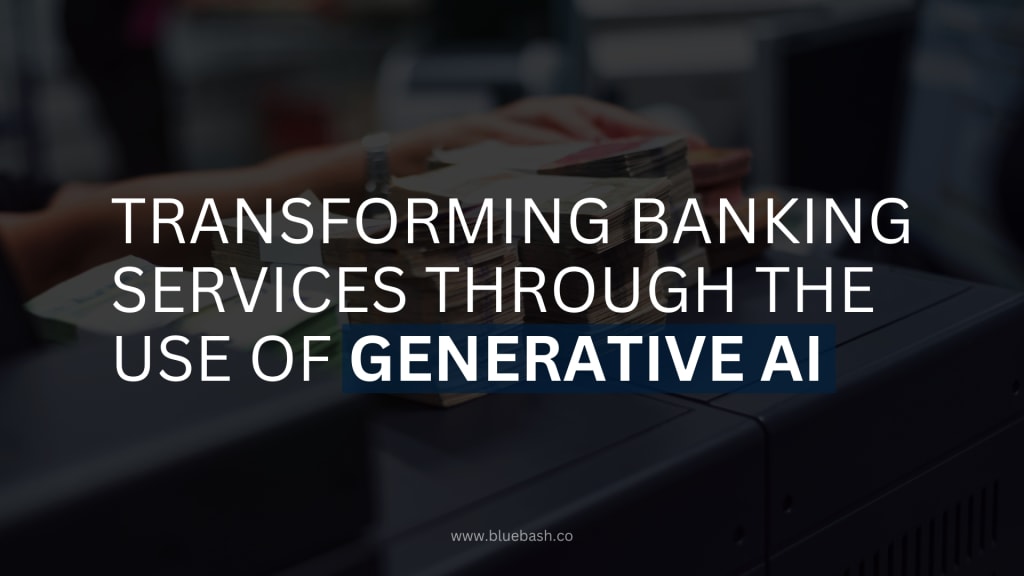
Generative AI tools that are powered by machine learning models are revolutionizing the banking industry. For example, you can consider, the online payment platform Stripe recently announced that it is integrating GPT-4 into its products. This is one of many integrations happening across fintech.
Though this we are still considering it as the beginning of the Generative Artificial Intelligence revolution, as there is no doubt regarding the areas of banking. Some of the different verticals deal with financial services that are expected to be hit hardest, include retail banking, wealth, SMB Banking, commercial banking, and Investment banking.
What does Generative AI specify in the Banking Industry?
AI-based software like chatgpt is very popular these days. It is backed by machine learning models and is dramatically changing banking and financial services. The nature of the landscape of AI and automation for banking is very wide. It mainly offers a unique approach to automating tasks that are previously laborious. But what are the other specific applications and others? We will highlight all the top use cases.
These points may include reshaping customer service through AI-based Chatbots like Chatgpt, employing AI for enhanced fraud detection, using machine learning to forecast financial trends, and customizing banking services for individual needs.
Top Use Cases of Generative AI in Banking and Financial Institutions
- AI's Role in Banking: Safeguarding Against Fraud
The role of AI in Banking serves a crucial role in the prevention of fraud. Cybercrime Magazine reports that global cybercrime costs soared to $6 trillion in 2021, with projections indicating a staggering $10.5 trillion by 2025. In light of these alarming figures, safeguarding sensitive data has become paramount for financial institutions.
Traditionally, banks have maintained extensive and costly fraud prevention departments, which sometimes fall short in terms of efficacy. However, there is a more innovative approach available.
By harnessing Generative AI, to its use in the insurance sector for fraud detection, banks can monitor transactions based on various parameters such as location, device, and operating system. Any deviations from established patterns are promptly flagged as potential anomalies or suspicious behavior. Bank personnel can then review these instances for further investigation. This process eliminates the need for time-consuming manual transaction scrutiny, which is prone to human error.
Furthermore, Generative Artificial Intelligence excels in continuously analyzing synthetic data and updating its detection algorithms to stay ahead of evolving fraud tactics. This proactive stance enables banks to anticipate and thwart fraudulent activities before they occur.
Generative AI can also enhance security by implementing additional verification measures when users access their accounts. For instance, an AI-powered chatbot can request users to answer security questions or engage in multi-factor authentication (MFA) for added protection.
- Utilizing Generative Artificial Intelligence for Risk Management and Enhanced Credit Scoring
Generative Artificial Intelligence (AI) can play a pivotal role in helping banks effectively manage credit risk and optimize credit scoring processes. Risk management is a critical aspect of safeguarding financial stability and ensuring the smooth operation of a financial institution. By harnessing the power of Generative AI trained on historical data, banks can proactively identify and address potential risks and financial vulnerabilities, offering them valuable early warning indicators to adapt and mitigate losses.
Similarly, Generative AI can revolutionize the traditional approach to credit scoring. Instead of relying solely on conventional credit score components, banks can leverage machine learning algorithms and AI capabilities to comprehensively analyze vast datasets from diverse sources. This approach provides a more comprehensive and nuanced assessment of loan applicants' financial profiles, enabling banks to make more informed lending decisions.
- Creating Financial Projections
Using AI trained on historical financial data offers banks the advantage of generating financial projections and facilitating synthetic data creation.
Generative AI has the capability to recognize data patterns and correlations, allowing it to conduct simulations rooted in hypothetical scenarios. Consequently, it assists banks in assessing a spectrum of potential outcomes and devising appropriate strategies.
In summary, Generative Artificial Intelligence leverages historical data to enhance banks' future financial decision-making and produce synthetic data for comprehensive risk exposure analyses.
- Customize Your Marketing Strategies
In the world of business, banks, like any other entity, must invest in specialized marketing initiatives to distinguish themselves from the competition and attract fresh clientele. Yet, this task is more complex than it appears, involving extensive customer analysis and creative endeavors that can be both costly and time-intensive.
Nonetheless, Artificial Intelligence offers a means to expedite your marketing endeavors. How? By scrutinizing your customers' preferences and online interactions, AI can categorize your leads into distinct segments, enabling the creation of varied buyer personas. This enables you to tailor your marketing campaigns to different groups, aligning with market conditions and emerging trends.
- Summarize large documents
Banks frequently grapple with the challenge of handling extensive paperwork. The manual process of sifting through, analyzing, and approving diverse financial documents and applications is both time-consuming and costly.
To reduce operational expenses, banks can employ Generative AI to sift through vast document volumes, pinpoint crucial information, and generate summaries for evaluation.
For instance, Generative Artificial Intelligence can streamline the summarization of customer communication records or meeting transcripts. This can lead to time savings when addressing customer inquiries or engaging in team-based projects.
- AI-Enhanced Personalized Financial Advice
Financial institutions such as mortgage brokers and investment firms have a valuable opportunity to leverage Generative AI in enhancing their services. This approach represents an ideal use case for AI in the financial sector, allowing financial advisors and companies to augment their human expertise with the capabilities of AI to offer customers more in-depth and personalized financial plans.
The initial step involves training the Generative AI on customer-specific data, including financial objectives, risk assessments, income levels, and spending patterns. Subsequently, this AI can be employed to create individualized budgeting and savings recommendations.
Similarly, when it comes to investment strategies, Generative AI can provide suggestions tailored to customers' financial goals, income, and investment timeframes. For financial planners, this offers the potential for making more informed decisions in investment management and trading, ultimately leading to improved wealth management outcomes.
Conclusion:
Generative AI is reshaping the future of banking. With its integration into various facets of the industry, from fraud prevention and risk management to customer service and personalized financial advice, the potential for innovation and efficiency gains is vast.
The recent adoption of Generative AI by leading fintech companies like Stripe signifies the beginning of a transformative era in banking. While we are still in the early stages of this Generative Artificial Intelligence revolution, its impact on banking is undeniable.
As we continue to explore the numerous applications and use cases, it's evident that Generative AI services plays a pivotal role in enhancing security, improving customer experiences, optimizing lending decisions, and streamlining operations across the banking sector.
In summary, the future of AI in banking is promising, and as technology advances further, it will undoubtedly bring about significant improvements in the way financial institutions operate and serve their customers.
About the Creator
Bluebash
Bluebash is a growing software development, technology consulting and digital application solutions company. We provide services to various industries including Finance, Healthcare, Education, Sports, and Retail.






Comments
There are no comments for this story
Be the first to respond and start the conversation.